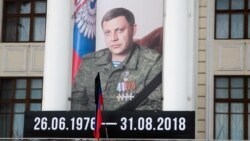Court arrests director of youth camp where fire killed three girls:
By RFE/RL's Ukrainian Service
ODESA, Ukraine -- A court in Ukraine's Black Sea port city of Odesa has arrested the director of a youth camp, where fire killed three girls on September 15.
The Kyiv District Court in Odesa on September 18 placed Petros Sarkisyan in a detention center for two months without possibility of bail on suspicion of violations of fire safety regulations that led to the deaths.
Authorities said on September 16 that the fire swept through the camp's two-story, wooden building shortly before midnight on September 15.
Police said that 42 children were inside the building at the time of the fire.
After extinguishing the fire, rescue workers found the remains of two girls and said that a third girl was unaccounted for.
Fragments of a third body that are believed to belong to the missing girl were found later.
Ukrainian Prosecutor-General Yuriy Lutsenko, on September 18, expressed condolences to the relatives of the three girls and Odesa residents.
He also said that he has put the investigations of the tragedy under "special control."
On May 27, President Petro Poroshenko visited the Viktoria youth camp, and as media reports said then, "personally inspected and reopened" the camp after renovation works.
Ukraine and other former Soviet nations continue to be plagued by frequent deadly fires due to aging infrastructure and often slipshod fire-safety practices.
Clashes erupt after acquittals in trial over deadly 2014 violence in Odesa:
By RFE/RL's Ukrainian Service
Police in Ukraine are investigating clashes that broke out on September 18 after a court acquitted 19 defendants who were tried over deadly violence between pro-Russian and Ukrainian activists in the southern city of Odesa in May 2014.
Police used tear gas to disperse some 100 activists protesting the acquittals at a court in Chornomorsk, the town near Odesa where the trial was held.
Ruslan Forostyak, adviser to the Odesa regional police chief, said on September 19 that 20 police officers and 15 officers of the National Guard were injured.
Outside of eastern Ukraine, where a war that broke out in April 2014 has killed more than 10,000 people, the May 2, 2014 unrest in Odesa was the deadliest violence to erupt in connection with Russia-backed efforts to foment separatism in Ukraine after Moscow-friendly President Viktor Yanukovych was pushed from power by protests that February.
A total of 48 people were killed in Odesa that day, most of them in a blaze that was apparently set off by firebombs thrown inside a building where they had sought refuge amid the street fighting. Russia and Ukraine have blamed one another for the violence and deaths.
The 19 people who were acquitted had been charged with inciting clashes on Odesa's Hretska Square that led to the death of six people.
Two of the acquitted, a Russian and a Ukrainian, were rearrested shortly after the hearing and charged with separatism.
Saakashvili demands documents that stripped him of citizenship:
By RFE/RL's Ukrainian Service
KYIV -- Mikheil Saakashvili, the ex-governor of Ukraine's Odesa region and former president of Georgia, has arrived in Ukraine's capital, where he vowed to challenge the revocation of his Ukrainian citizenship.
Speaking to journalists outside the building of the presidential administration on September 19, Saakashvili demanded that the presidential office and state bodies provide him and his lawyers with all the documents related to President Petro Poroshenko's decree stripping him of citizenship.
Saakashvili -- formerly Georgian, then Ukrainian -- has been a stateless person since Poroshenko's decision in July.
He defied Ukrainian authorities on September 10 and made a chaotic crossing into the country from Poland, helped by hundreds of his supporters.
Addressing supporters in the western city of Chernivtsi on September 13, Saakashvili said that he had returned to Ukraine to help solve the country's "political crisis" -- "not simply" to challenge the revocation of his Ukrainian citizenship.
On September 18, a court in Ukraine's western Lviv region was scheduled to start hearings into what officials called his illegal entry into the country, but the hearing was postponed to September 22.
Ukraine's top prosecutor has said that Saakashvili will not be arrested or extradited to Georgia, where the ex-president is wanted on allegations of corruption during his time in office.
"Saakashvili will not be arrested in this case, Saakashvili cannot be extradited from this country while he has a residence permit or other document that he has filed," Prosecutor-General Yuriy Lutsenko said on September 16, suggesting that the stateless ex-leader may have a document allowing him to remain in Ukraine.
Lutsenko also said that those who helped bring Saakashvili across the border would face criminal charges but would not be arrested.
But he added that those who "beat Ukrainian border guards" would face arrest and prosecution.
Authorities claim that several border officers were injured in the altercation at the border with Saakashvili's supporters.
The Georgian government is seeking Saakashvili's arrest and extradition on allegations that he misappropriated property and abused his powers when he was president of his native country from 2004 to 2013.
He denies the allegations and says Georgia's extradition request was made on behalf of "oligarchs" who fear his presence in Ukraine.
After leaving Georgia for self-imposed exile in the United States in 2013, Saakashvili went to Ukraine in 2015 to work for the country's pro-Western authorities as governor of the Odesa region.
He lost his Georgian citizenship when he was granted a Ukrainian passport in 2015 because Georgia does not allow dual citizenship.
Saakashvili quit as governor in November 2016, complaining of official obstruction of anticorruption efforts, accusing Poroshenko of dishonesty, and charging that the government in Kyiv was sabotaging crucial reforms.




